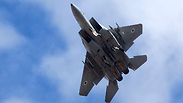
The Israel Air Force was scheduled to stop most of its training flights on Sunday, in a move unprecedented in its scope, the likes of which hasn't been seen since December 2005.
After cancelling the weekly training flights for reservist pilots, the IAF was now expected to ground training flights for conscript pilots as well.
In addition to training flights, the IAF intends to cancel some of its operational flights, including intelligence gathering sorties.
Related stories:
- IAF grounds reserve pilots as part of budget battle
- Finance Ministry rebuffs Defense Ministry on budget
- IDF facing budget disaster; Ya'alon: 'The money is gone'
The move, however, will not hurt IAF readiness, and the Air Force's fighter jets will continue protecting Israel's borders. The Air Force Academy was also scheduled to continue regular activity.
Senior defense officials warned that the IAF was expected to ground more flights in the coming months.
The IAF has already cancelled its participation in "Red Flag," an advanced aerial combat training exercise hosted by the US Air Force in the summer.
"The blow to the level of readiness of pilots who stop training will be more costly and complicated than the actual cost of the training flights," the defense sources said.
The Defense Ministry demands an immediate addition of NIS 2.9 billion to resume training, as part of the negotiations on the 2015 budget, that are due to start soon.
The Locker Committee, entrusted with examining the entire defense budget, began its work only recently, and might not be ready to present its findings in time for the 2015 budget discussions.
"The IDF's 2014 work schedule was planned responsibly, taking under consideration the planned operations and the size of the army, both of which have been approved by the cabinet and the Foreign and Defense Committee," the IDF Spokesman's Office said. "Throughout the process, the repercussions of this work schedule have been presented and explained to all relevant bodies. At the time, we made it clear that in May, the IDF will reach a point in which it will have to make hard decisions."
Other cutbacks include cancelling some of the IDF delegations to Poland planned for later this year, and allocating less spots in a program helping combat soldiers receive a high school diploma as they near the end of their military service.
What will soldiers serving in Ze'elim do?
The decision to cut down on air force flights was preceded by the order to freeze reservists training due to a lack in funding. Hundreds of conscript soldiers and officers, who are supposed to aid in the training of the reserve battalions as part of their service, could now be left without any occupation.
The soldiers provide a complete array of support for each reserve battalion that arrives for training every week and are comprised of conscript soldiers serving in a variety of units.
Testimonies from soldiers serving in the national training center in Ze'elim, the main training base for reservists in Israel's south, indicate that the large base and its firing ranges have now been mostly left stranded.
"The base is used to providing service for thousands of reserve soldiers who come to training sessions, but now there is no one to train. It feels like a training curfew has been imposed," an officer who serves at the base told Ynet.
It is not unlikely that a similar situation will unfold in other bases that provide services for reserve soldiers, such as three training bases in Elyakim, Hevel Lakish, and a base near Ze'elim.
Security sources said that IDF had foreseen the crisis, which prompted officials to reschedule many training exercises to the beginning of 2014. Currently, they are trying to figure out what to do with the soldiers, especially those who as part of their service support the reserve force.
Most likely some of them, such as infantry instructors or instructors from the Armored Corps, will reinforce regular service units, and be partnered with other instructors that have already been assigned to train regular service battalions.
In response, the IDF Spokesperson's Office stated that "contrary to what was claimed, the soldiers responsible for training reservists do not train solely reserve divisions, but also regular service divisions. As a result, the soldiers train during their service both reserve divisions and regular service battalions, which means their employment is guaranteed."















